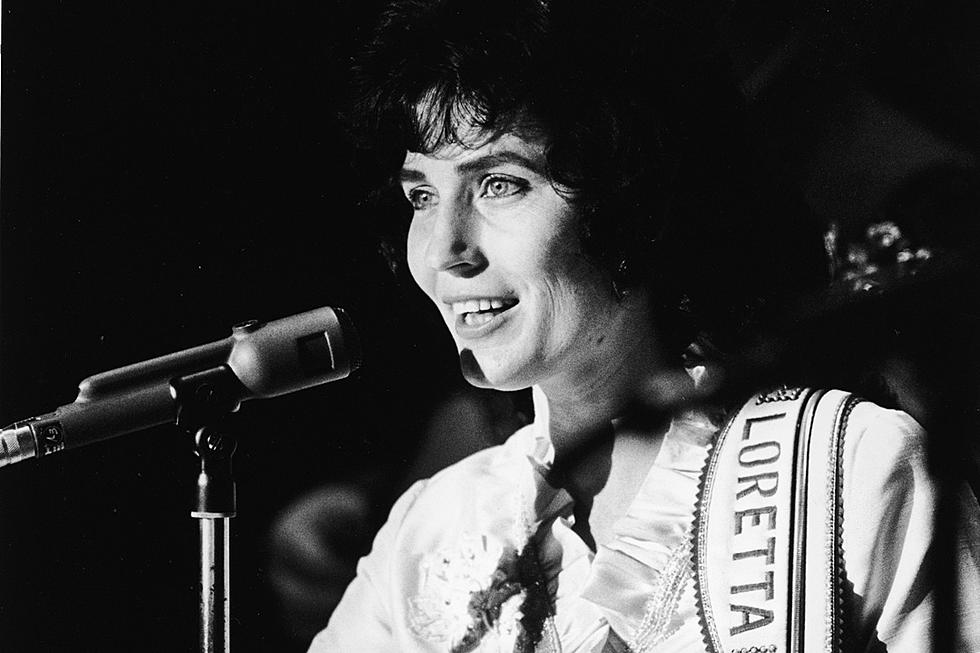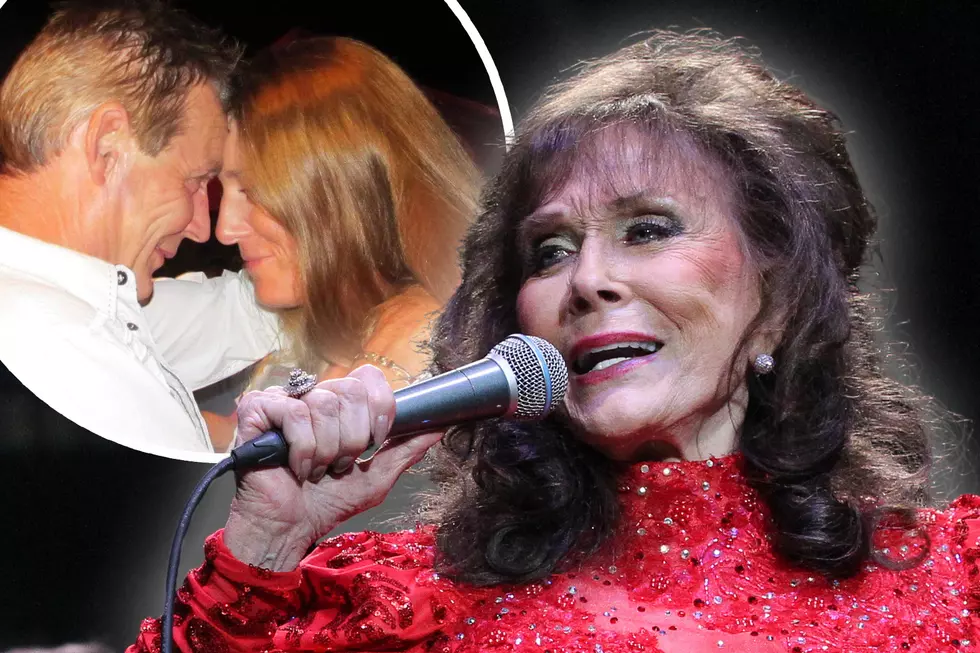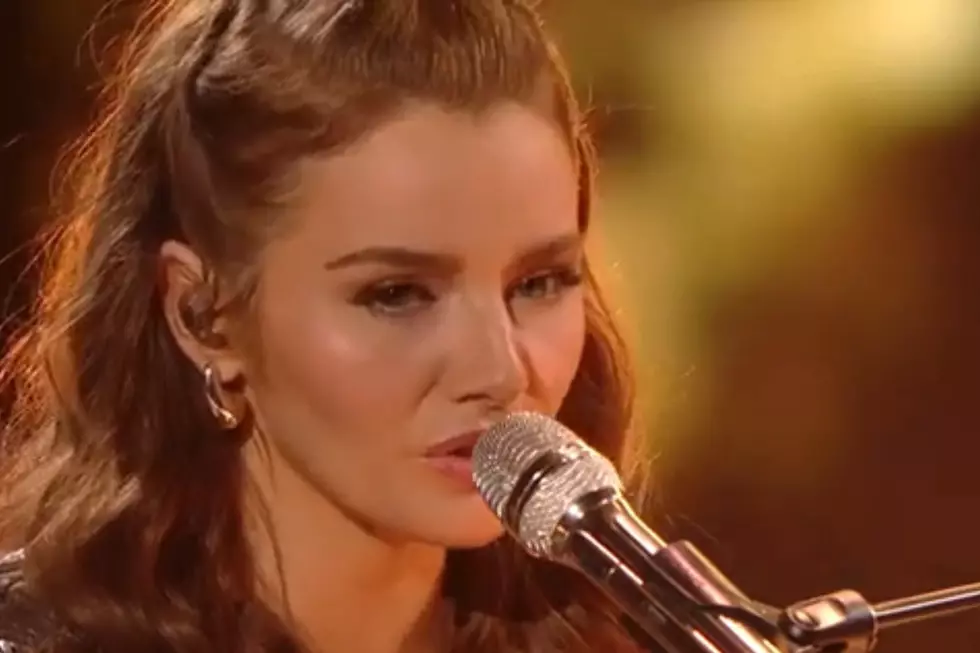
20 All-Time Best Loretta Lynn Songs
Loretta Lynn’s story is one of the most celebrated in the history of American music and her songs are some of the most memorable. These are her Top 20.
The Country Music Hall of Famer arrived on the scene with an independent recording of "I’m a Honky Girl" in 1960. After a move to Decca Records with producer Owen Bradley, Lynn would rise to the top of country music at the forefront of the women’s liberation movement. This list represents the best of those songs that inspired women and told Lynn's own story, and those which have secured a place in country music history.
Encompassing her entire career — from her 2021 album Still Woman Enough, which was the last she released during her lifetime, to the controversial story of "The Pill" and her award winning duets with Conway Twitty — these are the Top 20 Loretta Lynn songs.
The list was made up of sales and radio success, cultural impact, influence on the next generation and good old fashion fan and critic opinion. Is there a song you think belongs? Share your favorite Loretta Lynn song in the comments section below, especially if you can attach a personal story to some of her top songs. Lynn is a legend, one of the greatest country artists of either gender to be played on country radio.
On Oct. 4, 2022, Lynn died at the age of 90 at her home in Hurricane Mills, Tenn. That day, her family issued a statement saying that she "passed away peacefully" in her sleep. Her music will live on forever.
- 20
"Dear Uncle Sam"
From 'I Like 'Em Country' (1966)The only song Lynn wrote for her 1966 album, I Like 'Em Country, "Dear Uncle Sam" approaches subject matter that's relatively uncommon for Lynn -- wartime -- but delivers a poignant meditation on a controversial issue with the same frankness and honesty that she uses in all her songwriting. "Dear Uncle Sam" speaks from the perspective of a wife whose husband is headed overseas to fight in the Vietnam War, saying "Don't misunderstand, I know he's fighting for our land / I really love my country, but I also love my man."
- 19
"Wouldn't it Be Great"
From 'Just a Woman' (1985)A minor hit for Lynn in 1985 after she released it as a single off her Just a Woman album, "Wouldn't it Be Great" would go on to make some significant reappearances over the course of her career. She re-recorded it in 1993 as part of a collaborative effort with Dolly Parton and Tammy Wynette, for the Honky Tonk Angels album, and then again as the title track of her 45th studio album in 2018. It was the last song she ever wrote for her husband, Oliver "Doolittle" Lynn, whose drinking habits inspired the lyrics. She sang it to her husband as he was on his deathbed, in 1996.
- 18
"You're the Reason Our Kids Are Ugly" (with Conway Twitty)
From 'Honky Tonk Heroes' (1978)Loretta Lynn is well-known for her sharp, incisive and controversial song-writing, but she was also a great comedic performer when the occasion called for it, and there's no better representation of that than "You're the Reason Our Kids Are Ugly," a duet with Conway Twitty off the pair's eighth collaborative album, Honky Tonk Heroes. Twitty and Lynn play a beleaguered mom and dad in this song, doling out light-hearted blame against each other as the root of their problems -- but ultimately finding a way to laugh off the tough times.
- 17
"I Wanna Be Free"
From 'I Wanna Be Free' (1971)A Top 5 hit on the Billboard Hot Country Singles chart upon its original 1971 release, "I Wanna Be Free" had staying power even amid Lynn's massive, impactful catalog: She re-recorded the song in 2021 as part of her Still Woman Enough album. The song's lyrics describe a woman who still feels chained to a marriage, even though her husband has left her, and finally decides to release herself from the loyalty and love keeping her attached to a dead relationship.
- 16
"Hey Loretta"
From 'Coal Miner's Daughter' (1973)Though it was written by Shel Silverstein, "Hey Loretta" contains all the sharp-tongued, forthright messaging that a listener might expect from a song that Lynn penned herself. Its lyrics describe a woman who unfetters herself from all the thankless duties of being married to an ungrateful man, telling him that "You can feed the chickens and you can milk the cow / This woman's liberation, honey, is gonna start right now."
- 15
"Blue Kentucky Girl"
From 'Blue Kentucky Girl' (1965)The title track and only single off her Blue Kentucky Girl album from 1965, this song was a Top 10 hit for Lynn. It describes familiar subject matter for the singer -- life in rural Kentucky -- and offers a wistful reflection about missing the man who left her for brighter lights and bigger cities. In the decades after Lynn's version came out, "Blue Kentucky Girl" was also recorded by Emmylou Harris and Skeeter Davis.
- 14
"After the Fire is Gone" (with Conway Twitty)
From 'We Only Make Believe' (1971)Coming off of Lynn's first collaborative album with Conway Twitty, "After the Fire is Gone" was one of the first songs that introduced listeners to their power as a double act. The song was Twitty and Lynn's first No. 1 hit together, and it earned them a Grammy Award for Best Country Performance by a Duo or a Group With Vocal. This lovelorn heartache ballad spent 14 weeks on the country chart, and spawned cover versions by country greats like Willie Nelson with Tracy Nelson, and Tanya Tucker.
- 13
"Still Woman Enough"
From 'Still Woman Enough' (2021)In March 2021, at age 88, Lynn released Still Woman Enough, her 46th album and the last she would put out during her lifetime. The title track, "Still Woman Enough," nods to her classic hit "You Ain't Woman Enough," and tells the story of Lynn's enduring legacy as a woman and as a country music legend. The version of "Still Woman Enough" that appears on the album features verses from Reba McEntire and Carrie Underwood, who share elements of their own biographies as they prove that -- like the country great who came before them -- they're "Still Woman Enough."
- 12
"Love is the Foundation"
From 'Love is the Foundation' (1973)A two-week No. 1 single that remained on the chart for a total of 13 weeks, "Love is the Foundation" was the title track of an album Lynn released in 1973. Written by songwriter William C. Hall, the song is a soaring love ballad and affirmation of the power of a lasting relationship. Years afterward, in 1994 Lynn sang the song to her husband, Oliver "Doolittle" Lynn, on a television broadcast, surrounded by Brenda Lee and a young Faith Hill.
- 11
"Rated X"
From 'Entertainer of the Year' (1973)The only single to come off of Lynn's 1973 Entertainer of the Year album -- and the only song on the project that she wrote -- "Rated X" became Lynn's sixth No. 1 career hit on the country charts after she sent it to radio in late 1972. Like many of the country legend's other songs, "Rated X" spoke frankly about stigmatized issues; the song's lyrics describe the double standard that divorced women faced at the time.
- 10
"Miss Being Mrs." (Featuring Jack White)
From ‘Van Lear Rose’ (2004)Representing one of her projects from the 2000s, "Miss Being Mrs." is from the album Van Lear Rose, produced by Jack White of the White Stripes. The album’s unique pairing proved to be quite daring and rewarding. The project received positive reviews and earned five Grammy nominations, with this single earning Best Country Song and Best Country Female Vocal Performance nods. Out of all the selections on the album, including ‘Portland, Oregon,’ we feel this song has a closer connection to Lynn’s heart, as it was released as a tribute to her late husband.
- 9
"The Pill"
From ‘Back to the Country’ (1975)The most controversial song of Loretta Lynn's career, "The Pill" was banned by many radio stations due to it’s risqué subject matter of birth control. At that time, discussions of this nature were considered inappropriate, especially by a female. In several interviews following the song’s success, Lynn insisted that physicians told her that this song had done more to highlight the availability of birth control in isolated, rural areas, than all the literature they'd released. This progressive single is a must-have on our list of the Top 10 Loretta Lynn songs.
- 8
"You’re Lookin’ at Country"
From ‘You’re Lookin’ at Country’ (1971)Loretta Lynn is as country as can be! The feisty country bumpkin was born in Butcher Holler, Kentucky. The second of eight children in a poverty stricken family, Lynn beat the odds and rose to stardom. Named after movie star Loretta Young, Lynn never lost her country charm, even after hitting it big. Like many of her hits, "You’re Lookin’ at Country" also tells the story of Lynn’s life — a story that related to so many others during this era.
- 7
"One’s on the Way"
From ‘One’s on the Way’ (1971)"One’s on the Way" is a comical song about being pregnant. The tune hit a chord with every woman who had married too young and had one too many children. It’s no surprise that this story came from the twisted mind of Shel Silverstein, the great poet, cartoonist, songwriter, and author, who also penned "A Boy Named Sue" for Johnny Cash and "Marie Laveau" for Bobby Bare. Silverstein gave Lynn another hit by writing "Hey Loretta" in 1973. There’s no doubt that "One’s on the Way" belongs on our list of the Top 10 Loretta Lynn songs.
- 6
"Fist City"
From ‘Fist City’ (1968)Like many of her songs, "First City" mirrored a real life story. The song was inspired by the women who flirted and pursued Lynn's husband while she was busy touring. Lynn wrote the song as a warning for these women to stay away. Obviously, other ladies could relate to the song, especially those too timid to speak up, and once again, Lynn found success as the spokeswoman for her peers.
- 5
"Lead Me On" (With Conway Twitty)
From ‘Lead Me On’ (1971)When Loretta Lynn was paired with Conway Twitty in 1968, they became a successful duo thanks to their first No. 1 duet, "After the Fire Is Gone." "Lead Me On" was released as a single from their second duet album, and would help them win the first of four CMA Awards for Vocal Duo of the year from 1972-1975. Ironically, these duo awards would be the only major awards Conway Twitty would ever receive from the CMA throughout his amazing career.
- 4
"You Ain’t Woman Enough"
From ‘You Ain’t Woman Enough’ (1966)Produced by the great Owen Bradley — who also made hits for Patsy Cline, Kitty Wells, and Brenda Lee -- this single came from Loretta Lynn’s second studio album. The song once again tackled marital problems, which was a common theme in her music, and served as a warning for single ladies to stay away from her husband. One year after this song peaked at No. 2, Loretta Lynn won the CMA’s Female Vocalist of the Year Award.
- 3
"Louisiana Woman, Mississippi Man" (With Conway Twitty)
From ‘Louisiana Woman, Mississippi Man’ (1973)Released as the third single in the Conway Twitty/Loretta Lynn duet series, "Louisiana Woman, Mississippi Man" hit No. 1 in 1973. Prior to pairing with Twitty, Loretta Lynn’s first regular duet partner was Ernest Tubb. Although Tubb was nearly 20 years older than Loretta, together they hit with "Mr. and Mrs. Used to Be" and "Sweet Thang." However, as her career began to rise, it was suggested that she record duets with someone closer to her age. The result was someone she actually adored as a teenager -- former rock and roller Conway Twitty.
- 2
"Don’t Come Home a Drinkin" (With Lovin’ on Your Mind)'
From 'Don't Come Home a Drinkin' (1967)Loretta Lynn was encouraged by her husband O.V., a.k.a Mooney, to pursue a career in music. Despite his belief and support of his young talented wife, they had several marital problems, which inspired Lynn to write some strong songs. Lynn’s own troubles resembled those of many of her fans, who found the courage and strength to speak out thanks to songs like "Don’t Come Home a Drinkin" (With Lovin’ on Your Mind).' That's just one of the many reasons this song belongs on our list of the Top 10 Loretta Lynn songs.
- 1
"Coal Miner’s Daugher"
From ‘Coal Miner’s Daughter’ (1970)By the time "Coal Miner’s Daughter" was released in 1970, Loretta Lynn had already racked up 10 years of hits. Through the years, Lynn always wanted to write a song about her childhood, and the chance came while she was waiting to do some television work. While on break one day, she headed to her dressing room and wrote nine verses about her life. Trimmed down to six verses in the studio, the song became the most significant record of her career, plus the title of a best-selling book and movie.
More From Taste of Country

![See Inside Country Stars’ Most Charming Homes — No. 4 Is Breathtaking! [Pictures]](http://townsquare.media/site/204/files/2024/07/attachment-charming-country-stars-homes.jpg?w=980&q=75)

![These Country Song Lyrics Make Great Father’s Day Cards [PHOTOS]](http://townsquare.media/site/204/files/2024/06/attachment-Loretta-Lynn-Keith-Urban-George-Strait-Lainey-Wilson-Alan-Jackson.jpg?w=980&q=75)
![See Inside Country Stars’ Most Iconic Homes — No. 5 Is Epic! [Pictures]](http://townsquare.media/site/204/files/2024/05/attachment-iconic-country-stars-houses.jpg?w=980&q=75)




